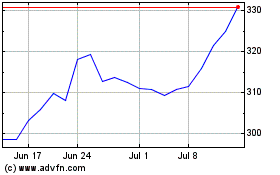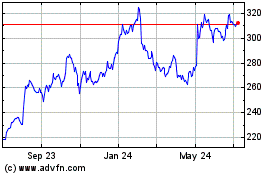Amgen to Sell Cholesterol Drug for 60% Less Than Original Price
October 24 2019 - 3:40PM
Dow Jones News
By Joseph Walker
Amgen Inc. said it will sell the cholesterol drug Repatha only
at a list price 60% lower than what the company had originally
charged, in a bid to make the medicine more affordable to patients
and kick-start sales.
Starting next year, Repatha will list for $5,850 a year for all
insurers, the biotech said Thursday.
The move could help reduce the amount that patients pay for the
drug at the pharmacy counter, and reduce the number of patients who
don't fill their prescriptions because their copays are too
expensive.
Amgen had priced Repatha for more than $14,000 a year upon its
approval in 2015.
Analysts had thought Repatha would ring up billions of dollars
in sales, but that hasn't happened in large part because insurers
have restricted coverage of the drug because of its price. In the
second quarter, Amgen reported just $91 million in sales from
Repatha.
To encourage more use, Amgen last year created a new version of
Repatha priced at $5,850 a year. The company temporarily still
offered the original list price option of more than $14,000, which
Amgen discounted heavily in the form of rebates.
Some health plans offered only the higher-priced Repatha, which
meant patients faced bigger out-of-pocket costs.
Amgen said it kept selling the higher-priced product to allow
time for insurers and pharmacy benefit managers to adjust to the
loss of rebates. In it latest announcement, the company said it
will stop selling the higher-priced version after Dec. 31.
Several pharmaceutical companies have cut the list prices of
drugs in the past year in an effort to extend to patients the
discounts they were already providing to pharmacy benefit managers,
known as PBMs, which negotiate prices on behalf of insurers and
employers.
Sanofi SA and Regeneron Pharmaceuticals Inc. sell a cut-rate
version of their own anti-cholesterol medicine Praluent -- which
competes with Repatha -- at a 60% discount to the original list
price.
Gilead Sciences Inc. in January launched generic versions of two
hepatitis C medicines priced at discounts of 68% and 62%,
respectively, to their branded counterparts. Eli Lilly & Co.
said in March that it would market a half-priced version of its
diabetes medicine Humalog.
The price cuts have typically been for drugs that were already
being discounted heavily with rebates. But rebates often failed to
ease the direct costs shouldered by patients in Medicare Part D and
high-deductible commercial health plans that require them to pay a
percentage of a drug's list price before rebates are applied.
About half of Medicare Part D patients taking Repatha will have
copays of less than $50 per prescription next year, Amgen said. By
discontinuing the higher-priced version of the drug, the company
said it expects to increase the portion of patients with copays of
$50 or less.
Some Medicare patients are required to pay as much as $370 per
month for Repatha, causing about three-quarters of patients to
abandon their prescriptions, said BMO Capital Markets analyst Do
Kim in a note to clients on Thursday.
He said Amgen's termination of the higher-priced product should
increase the number of patients paying fixed $50 copays and bring
down the abandonment rate closer to the 19% observed in commercial
plans.
Write to Joseph Walker at joseph.walker@wsj.com
(END) Dow Jones Newswires
October 24, 2019 15:25 ET (19:25 GMT)
Copyright (c) 2019 Dow Jones & Company, Inc.
Amgen (NASDAQ:AMGN)
Historical Stock Chart
From Mar 2024 to Apr 2024

Amgen (NASDAQ:AMGN)
Historical Stock Chart
From Apr 2023 to Apr 2024
